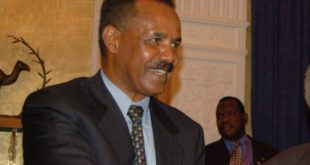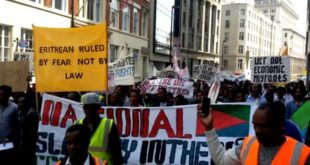Why Berhanu Nega traded a tenured position for the chance to lead a revolutionary force against an oppressive regime.
BY JOSHUA HAMMERAUG
Berhanu Nega was once one of Bucknell University’s most popular professors. An Ethiopian exile with a Ph.D. from the New School for Social Research in Manhattan, he taught one of the economics department’s most sought-after electives, African Economic Development. When he wasn’t leading seminars or puttering around his comfortable home in a wooded neighborhood five minutes from the Bucknell campus in rural Lewisburg, Pa., Nega traveled abroad for academic conferences and lectured on human rights at the European Parliament in Brussels. “He was very much concerned with the relationship between democracy and development,” says John Rickard, an English professor who became one of his close friends. “He argued that you cannot have viable economic development without democratization, and vice versa.” A gregarious and active figure on campus, he rooted for the Philadelphia Eagles and the Cleveland Cavaliers, campaigned door-to-door for Barack Obama in 2008 and was known as one of the best squash players on the Bucknell faculty. He and his wife, an Ethiopian-born optometrist, raised two sons and sent them to top-ranked colleges, the University of Pennsylvania and Carnegie Mellon. On weekends he sometimes hosted dinners for other Bucknell professors and their families, regaling them with stories about Abyssinian culture and history over Ethiopian food he would prepare himself; he imported the spices from Addis Ababa and made theinjera, a spongy sourdough bread made of teff flour, by hand.
Nega remained vague about his past. But students curious enough to Google him would discover that the man who stood before them, outlining development policies in sub-Saharan Africa, was in fact intimately involved in the long-running hostility between Ethiopia and neighboring Eritrea, a conflict that has dragged on for half a century. By the start of the millennium, its newest incarnation, a border war over a patch of seemingly worthless ground just 250 square miles in size, devolved into a tense standoff, with the two nations each massing along the border thousands of troops from both official and unofficial armies. One proxy army fighting on the Eritrean side, a group of disaffected Ethiopians called Ginbot 7, was a force that Nega helped create, founding the movement in 2008 with another Ethiopian exile, Andargachew Tsege, in Washington. The Ethiopian government, which had previously detained Nega as a political prisoner for two years in Addis Ababa, now sentenced him to death in absentia. Bucknell students who did learn about their teacher’s past were thrilled. “It made his classes exciting,” Rickard says.
In Ginbot 7, Tsege served as the political leader based in Eritrea; Nega was the group’s intellectual leader and principal fund-raiser, collecting money from members of the Ethiopian diaspora in Europe and the United States. That all changed one day in June 2014, when Tsege, known to everyone as Andy, made a brief stopover in Sanaa, the capital of Yemen, on his way to Asmara, the capital of Eritrea. As he sat in the airport transit lounge, waiting to board his flight, Yemeni security forces, apparently acting in collusion with Ethiopian intelligence, arrested him and put him on a plane to Addis Ababa, where he was paraded on state television and currently faces a death sentence.
Days after Tsege’s arrest and extradition, Nega volunteered to replace him in Eritrea. “Was I going to remain an academic, sitting in an ivory tower criticizing things?” he told me. “Or was I going to do something as an engaged citizen?” Nega put his house up for sale and took an indefinite leave of absence from the university. It was an extended sabbatical, he told his colleagues. Only a handful of close friends, his wife and his two sons knew the truth.
On a hot July afternoon in 2015, Nega packed a suitcase, bade his wife farewell and was driven by comrades to John F. Kennedy International Airport. He carried a laissez-passer from the Eritrean government, allowing him a one-time entry into the country. Nega was heading for a new life inside a destitute dictatorship sometimes referred to as the North Korea of Africa; the regime was notorious for having supported the Shabab, an Islamist terrorist group in Somalia, and for a military conscription program that condemns many citizens over age 18 to unlimited servitude. Nega also believes he has drawn the scrutiny of the Obama administration and was worried about being stopped and turned around by Homeland Security. It wasn’t until the wheels on the EgyptAir jet were up and he was settling into his seat over the Atlantic Ocean, bound for one of the most isolated and repressive nations on Earth, that he was able to relax.
–
Source: The New York Times Magazine
–
 ELL Eritrean Lowland League
ELL Eritrean Lowland League


